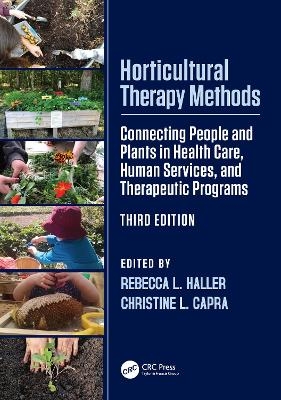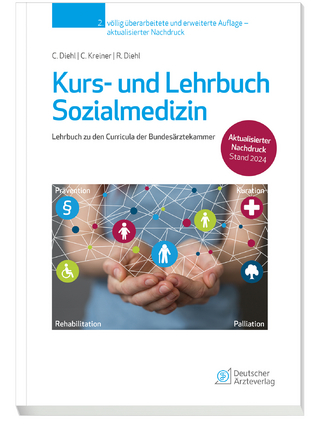
Horticultural Therapy Methods
CRC Press (Verlag)
978-1-032-76962-2 (ISBN)
- Noch nicht erschienen (ca. April 2025)
- Versandkostenfrei innerhalb Deutschlands
- Auch auf Rechnung
- Verfügbarkeit in der Filiale vor Ort prüfen
- Artikel merken
Horticultural Therapy Methods: Connecting People and Plants in Health Care, Human Services, and Therapeutic Programs was the first text to describe the processes and techniques used to provide horticultural therapy interventions, and the rationale for their use. The first edition was written to positively impact the professional practice of horticultural therapy and provide an array of strategies for horticultural therapy treatment. Prior to its publication, the topics were only addressed by other allied professions, but were not specifically tailored for horticultural therapy. The second edition updated material and added essential information on planning treatment sessions as well as providing techniques to address treatment issues for mental health, physical health, vocational skills and wellness. This third edition revises all chapter content, improves and expands appendices, adds a chapter on building relationships, provides new photos, includes additional case examples along with discussion questions, references, further reading, and key concepts.
Horticultural Therapy Methods is a clear instructive manual that explains:
· The process of treatment planning in horticultural therapy
· Session development, including activity or task selections to meet treatment objectives
· Therapeutic use of self and relationship building
· Motivation and behavior management techniques
· Adaptations and modifications to enable and challenge program participants
· How to maximize active engagement in horticulture and cultivation of plants
· Treatment documentation guidelines
· Practical approaches for mental health and other areas of practice.
Horticultural Therapy Methods: Connecting People and Plants in Health Care, Human Services, and Therapeutic Programs, Third Edition, is a reference and guide for students, educators and those using horticulture for therapeutic purposes to help construct effective treatment programs. Healthcare and human service professionals use the reference in the therapy, treatment, and education of inmates, residents, patients, trainees, students, and others. The aim of this book is to guide novice and experienced horticultural therapists to use accepted human service practices that are aligned with allied professions.
Rebecca L. Haller, HTM, has practiced and taught horticultural therapy since receiving an MS in horticultural therapy from Kansas State University in 1978. Currently the director of the Horticultural Therapy Institute in Denver, Colorado, Ms. Haller teaches horticultural therapy classes in affiliation with Colorado State University, delivers workshops, and provides consultation to new or developing programs. At Denver Botanic Gardens, she designed and taught a series of professional courses in horticultural therapy, managed the sensory garden, and created programs and access for people with disabilities. She established a vocational horticultural therapy program for adults with developmental disabilities in Glenwood Springs, Colorado, which is still thriving after more than thirty years in operation. She has served as president, secretary, and board member of the American Horticultural Therapy Association (AHTA) and has worked on teams related to education and professional standards. In 2005, she received the Horticultural Therapy Award from the American Horticultural Society. Awards from the American Horticultural Therapy Association include: the Publication Award in 2009 and the Rhea McCandliss Professional Service Award in 2015. She has authored articles and chapters in the following publications: HortTechnology, Horticulture as Therapy: Principles and Practice, Horticultural Therapy and the Older Adult Population, Towards a New Millennium in People-Plant Relationships, AHTA News Magazine, The Public Garden, Acta Horticulturae, and Outdoor Therapies: An Introduction to Practices, Possibilities, and Critical Perspectives. She co-edited and wrote chapters in The Profession and Practice of Horticultural Therapy. Christine L. Capra, BA, is the program manager at the Horticultural Therapy Institute in Denver, Colorado. She and partner, Rebecca L. Haller, HTM, cofounded the institute in early 2002, which continues to offer accredited horticultural therapy education to students from across the United States and abroad. Previously, she worked as the program coordinator at the Denver Botanic Gardens’ horticultural therapy program. She has a BA in journalism from Metropolitan State University in Denver. Ms. Capra has written for numerous publications including OT Weekly, Mountain Plain and Garden, Green Thumb News, People-Plant Connection, AHTA News, GrowthPoint, The Community Gardener, Health and Gardens, Colorado Gardener, Our Sunday Visitor, Making Connections (Horticultural Therapy Institute Quarterly Newsletter), and Jardins. She co-edited The Profession and Practice of Horticultural Therapy. She was a reporter for the Denver Catholic Register newspaper for many years. She has received writing awards from the Society of Professional Journalists, the Catholic Press Association, and the Colorado Press Association. In 2009, she was awarded the Publication Award from AHTA.
Chapter 1. The Framework
Rebecca L. Haller
Introduction
Shaping a Profession
Horticultural Therapy Defined
Program Settings, Types, and Goals
Understanding the People Served
Horticulture As a Therapeutic Modality
Summary
References
Chapter 2. Goals and Treatment Planning: The Process
Rebecca L. Haller
Introduction
Treatment Teams
The Process of Treatment Planning
Summary
For Further Study
Chapter 3. Activity Planning: Developing Horticultural Therapy Activities and Tasks
Pamela A. Catlin
Introduction
Horticulture As a Vehicle to Meet Wide-Ranging Goals
Activity or Task Selection to Meet Treatment Objectives
Additional Considerations for Activity Planning
Planning for Seasonality and Efficient Use of Horticultural Resources
Idea Sources for Tasks and Activities
Summary
References
Chapter 4. Cultivating Respectful Relationships in Horticultural Therapy
Jay S. Rice
Introduction
Definition and Etymology of Respect and Relationship
Applications to Horticultural Therapy Methods
Respectful Relationship with Self
Respectful Relationship with Clients
Respectful Relationship with Plants
Summary
References
Chapter 5. Working with Program Participants: Techniques for Therapists, Trainers, and Program Facilitators
Karen L. Kennedy
Rebecca L. Haller
Introduction
Facilitation and Group Leadership
The Therapeutic Use of Self
Motivation and Behavior-Management Techniques
Training
Adaptation and Modification
Summary
References
Chapter 6: Planning Horticultural Therapy Treatment Sessions
Karen L. Kennedy
Introduction
Goals and Documentation as a Basis for Sessions
Evidence-Based Practice
Therapeutic Interventions
Session Review and Evaluation
Summary
For Further Study
Chapter 7. Documentation: The Professional Process of Recording Treatment Plans, Process, and Outcomes
Sarah Sieradzki
Introduction
Purpose and Importance of Documentation
General Guidelines for Horticultural Therapy Documentation
Individualized Documentation
Group Documentation
Summary
For Further Study
| Erscheint lt. Verlag | 1.4.2025 |
|---|---|
| Zusatzinfo | 52 Tables, black and white; 2 Line drawings, color; 63 Halftones, color; 65 Illustrations, color |
| Verlagsort | London |
| Sprache | englisch |
| Maße | 156 x 234 mm |
| Themenwelt | Medizin / Pharmazie ► Physiotherapie / Ergotherapie ► Rehabilitation |
| Naturwissenschaften ► Biologie ► Botanik | |
| Weitere Fachgebiete ► Land- / Forstwirtschaft / Fischerei | |
| ISBN-10 | 1-032-76962-9 / 1032769629 |
| ISBN-13 | 978-1-032-76962-2 / 9781032769622 |
| Zustand | Neuware |
| Haben Sie eine Frage zum Produkt? |
aus dem Bereich


